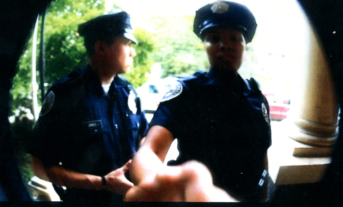If You Have a Police Encounter, Protect Your Rights
- What you say to the police is always important. Everything you say can be used against you.
- You have the right to speak. To exercise this right, you should tell the police, “I would like to remain silent.”
- You never have to consent to a search of yourself, your belongings, your car or your house. If you do consent to a search, it can affect your rights later in court. If the police say they have a search warrant, ask to see it.
- If they don’t, say “I do not consent to this search.” Police cannot arrest you simply for refusing to consent to a search. This may not stop the search from happening, but it will protect your rights if you have to go to court.
- Do not interfere with or obstruct the police – you can be arrested for it.
Being stopped by the police can occur anywhere, any time, when least expected. That’s why it’s very important to know your rights as a citizen regarding interaction with law enforcement officers. I will attempt to discuss some basic rules for dealing with police encounters:
- Do Not get angry. Always keep your cool and be calm.
- Do Not tell them that you know your rights, acting semi-naive is best.
- Do Not answer trick questions like “Do you know why I stopped you?”, you DO NOT know.
- Do Not agree to a search, EVER.
- Do Not just wait, ask “am I free to go?”
- Do Not get tricked by threats, cops can and do lie.
- Do Not admit anything. Remain silent instead.
- Do Not let them in without a warrant.
- Do Not Be Rude or Uncooperative.
- Do Not answer questions without a lawyer, their misconduct can always be challenged in court.
Do Not Get Angry
Generally speaking, no one likes an obnoxious, irrational person. Cops are no different. De-escalation is the primary objective. So, be a rational human being doing everyday rational human being things. You’re busy and you need to get back what you were doing. It doesn’t matter if you have been wrongfully arrested and you are full of rage from the injustice. Try to resist the temptation to spout off terrible things to the police officer, even if you have been wrongly arrested. Police have a lot of discretion in what charges are brought. They can change a misdemeanor to a felony, add charges, or even take the trouble to talk directly to the prosecutor and urge them to go harder on you. When you are being a jerk, you are just provoking the officers and to them, it feels like you are trying to disparage them. Don’t do this. Everyone is on the same level here. Be respectful. The only thing you need to tell them is that you are busy and would like to be on your way.
Do Not fall for trick questions
The police will ask loaded questions in an attempt to obtain information from you. It’s best to recognize these types of questions, and answer with a simple “I don’t know” or equivalent. For example, they may ask “Do you know why I pulled you over?”. If you answer “Because I was speeding?”, you essentially just admitted to speeding whether you were or not. The correct answer is “I don’t know, officer”. When asked why you were pulled over, DO NOT GUESS. Also, do not attempt to answer the question in a DWI investigation, on a scale of 1-10, how intoxicated are you? This is a trick question. Any answer that is not zero is you admitted to being at least somehow intoxicated. Read more on this HERE.
Do Not ever agree to a search
The police have no right to search unless there is something illegal that they can see, smell or hear. This is called probable cause. If they don’t have probable cause, then they must obtain a warrant to search. NEVER EVER agree to a search. In fact, say it clearly “I do not agree to a search”. Do not allow the police to search anywhere! If they ask, it probably means they don’t believe they have the right to search and need your consent. If you are ordered to hand over your keys, state loudly “You do NOT have my permission to search.” This is also a good reason not to talk, even if it seems all is lost when they find something incriminating. If the police officer asks, they do not have the right to search and must have your consent. If you are asked make sure you proclaim to any witnesses that “You (the police) do not have consent to search.” Also, if you consent to a search, the officers may find something that you had no idea you or someone else had left in there.
Do Not be Intimidated by Threats
The police can and will lie to you to get you to admit guilt. Don’t do it. An aggressive officer may get angry that none of his tactics are working that allows him to violate your rights. Just sit there calmly and silently if the officer begins to yell threats to you. Keep telling him you would like to be on your way.
Do Not Admit Anything, Remain Silent
In the event that they are placing you under arrest, it is best to remain silent at this point. Anything you say can and will be twisted around to make a case AGAINST you in the report. They will never make a report that helps your case, or proves your innocence because that would make writing the report pointless in the first place. Just be quiet and comply with the officers. Do not say anything to the investigating police officer. You have a right to remain silent – so employ it! It cannot be stressed enough the importance of this rule. Do not talk! Don’t try to convince the officer of your innocence. It’s useless. Everyone is innocent, no one should be arrested and no one should be in jail and that is all the officer hears all day every day. They do not care generally whether you are innocent or guilty. Regardless, there is nothing they can do at this point. He or she only needs “probable cause” to believe you have committed a crime in order to arrest you. They do not decide your guilt and he actually doesn’t care if you are innocent or not. It is the job of the judge or jury to free you if he is wrong. Most times, when people speak to officers they say something that makes their situation far worse. Keep your mouth shut; there will be plenty of time to talk later. If you feel that urge to convince him he’s made a mistake, remember the overwhelming probability that instead you will say at least one thing that will hurt your case, perhaps even fatally. It is smarter to save your defense for your lawyer.
Do Not Let Them in Without a Warrant
As you have already stated that you do not agree to a search, do your best to not allow the police to enter your car, house, pockets, backpack or anything that you own without a warrant. Warrants are not easy to obtain and must be given in writing by a judge.
Do Not Be Rude or Uncooperative
As an upstanding Citizen, be as nice and respectful as possible. There is literally no reason to treat the cops rudely and it will always end up making things worse. Judges and Juries do not like individuals who are rude and mean to police officers.
Do Not Answer Questions Without a Lawyer
If you find yourself being arrested, clearly state to the police officers that you don’t want to answer any questions without a lawyer. Make sure that you get 3 phone calls and assume that the calls are recorded. Call your attorney immediately, or family/friends that will contact one for you. It’s incredible how many people feel that they can convince the officer, the booking officer or a detective (if your case reaches that stature) that they are not guilty. YOUR CASE IS NOT DECIDED BY THESE PEOPLE. They have no affect on guilty or not guilty. Wait to speak to your lawyer! My hardest cases to defend are those where individuals engaged in too much conversation. Incredibly, many will start babbling without the police having asked a single question. Judges and juries will discount or ignore what a suspect says that helps him, but give great weight to anything that seems to hurt him. The courts and juries in particular give enormous weight to “confessions” during this stage.






















